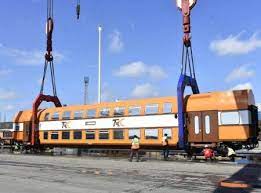The environmental and social impact study of the Malagarazi-Musongati-Gitega railway construction project in Burundi has been completed. Reportedly, the report has been published and is available on the African Development Bank’s website.
This is the first phase of the Multinational – Tanzania / Burundi / DR Congo joint standard gauge railway project.
The proposed railway line spans approximately 126 km, passing through three provinces (Makamba, Rutana, and Gitega). Additionally, eight communes will pass (Kayogoro, Bukemba, Giharo, Rutana, Musongati, Itaba, Makebuko, and Gitega) in Burundi. The goal of this railway line is to improve transportation infrastructure, promote regional economic integration. Moreover, the project will facilitate the development of mining, industrial, and agricultural areas in Burundi and Tanzania.
The estimated cost of the project is $1442.7 million, or $11.45 million per kilometre. It is anticipated that this will be an electrified Standard Gauge Railway (SGR) line. Furthermore, a multimodal bridge will be constructed on the border between Burundi and Tanzania.
Also Read: Tanzania to construct US$7b railway line from Dar to Burundi
Significance of the Malagarazi-Musongati-Gitega Railway Project to the Burndi and Tanzania’s economies
Importantly, Tanzania has recently begun an aggressive push to modernize its railway infrastructure, revamping its aging regional rail networks. For instance, in December 2022, Tanzania concluded a US$2.2 billion deal with China that will see a total SGR network of 2,561 kilometers. Moreover, linking the port city of Dar es Salaam to landlocked countries like the DRC, Rwanda, Burundi, and Uganda.
The line cost stands at US$10.04 billion. Importantly, the line poised to generate the longest modern rail network in Africa when completed in 2026.
A World Economic Forum Insight report 2023, ‘AfCFTA: A New Era for Global Business and Investment in Africa, projects the world’s largest single market will increase intra-African freight demand by 28%, leading to demand for almost 2 million trucks, 100,000 rail wagons, 250 aircraft, and more than 100 vessels, by 2030.
“Unlocking intra-regional trade will skyrocket the demand for logistics, with more small and medium-sized enterprises needing logistics providers to connect to bigger markets,” according to the report.
